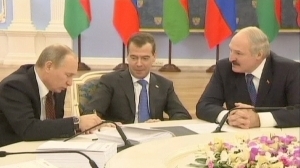
Illustration proposée par l'auteur
Belarus has taken historic step in its way to loose national independence, dealing gas contract.
Background information: the National gas transportation system (GTS) of Belarus includes 7.490 kilometers of the gas pipelines, five linear compressor stations, three underground gas storages, 233 gas-distributing stations, 26 automobile gas filling compressor stations and 7 gas-measuring stations. Its throughput per year makes 14-16 billion cubic metres of gas.
Until recently, the national company of Open Society “Beltransgas”, providing gas supply to internal consumers and participating in the international system of transportation of gas, was the unique owner and the operator of Belarusian GTS. This company carried out transit deliveries of the Russian natural gas to the Kaliningrad area (Russian Federation), Lithuania, Ukraine and Poland. In 2006 assets of the OJSC “Beltransgas” were estimated in $5 billion.
In November, 2011 Russia and Belarus have concluded contracts on gas deliveries and transit for 2012-2014. At the same time, the State committee on property of Belarus has signed the Contract with the Gazprom on the sale of second half of block of shares of the Belarusian OJSC Beltransgas in the amount of $ 2,5 billion.
Thus, Russia, represented by OJSC Gazprom became the individual owner of 100 % of the block of shares of the OJSC Beltransgas and the proprietor of all Belarusian gas transportation system.
Belarus officials and some mass-media estimates concession of national GTS to Moscow as a rather good deal and an indisputable victory of Minsk in “gas war” with brotherly Russia, tightened for long years. However, not everybody shares such opinion and high optimism of the Belarus authorities.
Alienation of the object of strategic importance in favour of the foreign state testifies to a pitiable condition of Belarusian economy, suffering really not the best times. Country gold and forex reserves are promptly exhausted. The phantom of an economic default has forced President Lukashenko to begin urgent privatization of the state assets to receive real money for maintenance of afloat sinking national economy.
Many foreign and domestic experts come to the consentient opinion, that A. Lukashenko has won local fight, losing strategic war. The control over Belarus GTS will bring to Moscow additional economic and political dividends in long-term prospect.
In particular, Byelorussian political scientist Valery Karbalevich notices: “after the gas-transport system of Belarus has passed to Gazprom, Belarus lost the lever of pressure upon Russia”. Actually, the Belarusian leader finally lost the basic facility of political influence to Russia. According to the expert, Belarus has got into a credit-debt trouble. It would be much more difficultl for Belarus to defend its national sovereignty.
Making comments on sale of 100 % of shares of Belarusian GTS, Ex-President of the National bank of Belarus Mr. Stanislav Bogdankevich has noticed: “Belarusian authorities by themselves provoked such succession of events. They repeatedly allowed aggravations concerning transit of the Russian gas to Europe. In turn, Russia constructed new gas pipeline bypassing Belarus. As a result, the importance of Belarusian GTS has sharply decreased”.
Starting this year, Belarus will receive the Russian gas at a discount, in exchange for Belarus joining to the Common Economic Space (Russia, Kazakhstan, Belarus) and control transfer to Russia over the strategic enterprise the OJSC Beltransgas. For support of the economic strategy and arrogant aspirations for revive at least similarity of Soviet Union on open spaces of the CIS, Russia shall ould fork up $3 billion. Thus is the price of returning of Minsk to an orbit, controlled by Russia.
Probably, Belarus has achieved for itself the maximum benefit from this deal, considering that fact, that national GTS was unprofitable. However, it is necessary to take into consideration risks and threats, arising to national interests.
The control, obtained by Gazprom, over the market of the internal prices for energy resourcesis is very dangerous for weak economy of Belarus. It is necessary to consider the fact, that pumping over through Belarusian GTS some billions of cubic metres of the gas, Gazprom single-handedly makes decisions concerning use of pipelines in the territory of the virtually sovereign state. At such expense, the gas monopolist can essentially reduce volumes of investments into roundabout gas transport routes (the Nord stream and the South stream), making the most precious gift to the Kremlin. Besides economic levers of influence on Minsk, Moscow obtains wide field for geopolitical battles with the neighbouring states and with the western countries, depending on deliveries of the Russian gas.
Following logic of gaz & economic expansion of Russia at all post-Soviet territory, it is possible to predict with confidence, that the following strategic target of Gazprom is the establishment of the complete control over the GTS of the neighbouring Ukraine. The head of the Gas Monopolist Mr. Alexey Miller repeatedly declared, that relations with Ukraine in gas sphere will be built under the Belarus scenario. Following his position, Russia has already offered such scheme to Ukraine, and the latest shall provide Russia the control over management of the Ukrainian GTS.
At the same time, according to estimations of some authoritative experts, under present conditions of the international economic and political conjuncture, Ukraine does not have sharp necessity to transfer its GTS in individual possession of Russia as it was made recently by Belarus. The role of Ukraine in a gas problem and its position are considerably different from the Belarusian. First, Ukraine plays very important role in transit of hydrocarbons to Europe, being a regional leader in this issue. Belarus practically has no such possibilities, hence, it has no corresponding levers of influence. Let see, Belarus provides transit of several tens billion cubic metres of gas per year; by-turn Ukraine delivers to the European consumers incommensurably more volume of approximately 140 billion cubic metres of gas per year. Secondly, Ukraine owns unique oil and gas storehouses, equipped by supplying infrastructure. And finally, Belarusian “gas” positions have been seriously undermined as a result of realization by Russia of the project the North Stream, intended for transportation of blue-sky fuel to Northern-EU countries. Ukraine has not suffered essentially from introduction of North stream in action, as well as the realization of the new Russian gas project the South stream, potentially threatening to its transit potential, at a current time is in doubt.
Political scientists predict unreasonably, that if Ukraine will go by the same way as Belarus, then Russia will have problems with control over Ukrainian gas pipe and its foreign policy as a whole. Indeed, Russia looses possibility to dictate its conditions to the European consumers of the Russian gas.
Background information: the National gas transportation system (GTS) of Belarus includes 7.490 kilometers of the gas pipelines, five linear compressor stations, three underground gas storages, 233 gas-distributing stations, 26 automobile gas filling compressor stations and 7 gas-measuring stations. Its throughput per year makes 14-16 billion cubic metres of gas.
Until recently, the national company of Open Society “Beltransgas”, providing gas supply to internal consumers and participating in the international system of transportation of gas, was the unique owner and the operator of Belarusian GTS. This company carried out transit deliveries of the Russian natural gas to the Kaliningrad area (Russian Federation), Lithuania, Ukraine and Poland. In 2006 assets of the OJSC “Beltransgas” were estimated in $5 billion.
In November, 2011 Russia and Belarus have concluded contracts on gas deliveries and transit for 2012-2014. At the same time, the State committee on property of Belarus has signed the Contract with the Gazprom on the sale of second half of block of shares of the Belarusian OJSC Beltransgas in the amount of $ 2,5 billion.
Thus, Russia, represented by OJSC Gazprom became the individual owner of 100 % of the block of shares of the OJSC Beltransgas and the proprietor of all Belarusian gas transportation system.
Belarus officials and some mass-media estimates concession of national GTS to Moscow as a rather good deal and an indisputable victory of Minsk in “gas war” with brotherly Russia, tightened for long years. However, not everybody shares such opinion and high optimism of the Belarus authorities.
Alienation of the object of strategic importance in favour of the foreign state testifies to a pitiable condition of Belarusian economy, suffering really not the best times. Country gold and forex reserves are promptly exhausted. The phantom of an economic default has forced President Lukashenko to begin urgent privatization of the state assets to receive real money for maintenance of afloat sinking national economy.
Many foreign and domestic experts come to the consentient opinion, that A. Lukashenko has won local fight, losing strategic war. The control over Belarus GTS will bring to Moscow additional economic and political dividends in long-term prospect.
In particular, Byelorussian political scientist Valery Karbalevich notices: “after the gas-transport system of Belarus has passed to Gazprom, Belarus lost the lever of pressure upon Russia”. Actually, the Belarusian leader finally lost the basic facility of political influence to Russia. According to the expert, Belarus has got into a credit-debt trouble. It would be much more difficultl for Belarus to defend its national sovereignty.
Making comments on sale of 100 % of shares of Belarusian GTS, Ex-President of the National bank of Belarus Mr. Stanislav Bogdankevich has noticed: “Belarusian authorities by themselves provoked such succession of events. They repeatedly allowed aggravations concerning transit of the Russian gas to Europe. In turn, Russia constructed new gas pipeline bypassing Belarus. As a result, the importance of Belarusian GTS has sharply decreased”.
Starting this year, Belarus will receive the Russian gas at a discount, in exchange for Belarus joining to the Common Economic Space (Russia, Kazakhstan, Belarus) and control transfer to Russia over the strategic enterprise the OJSC Beltransgas. For support of the economic strategy and arrogant aspirations for revive at least similarity of Soviet Union on open spaces of the CIS, Russia shall ould fork up $3 billion. Thus is the price of returning of Minsk to an orbit, controlled by Russia.
Probably, Belarus has achieved for itself the maximum benefit from this deal, considering that fact, that national GTS was unprofitable. However, it is necessary to take into consideration risks and threats, arising to national interests.
The control, obtained by Gazprom, over the market of the internal prices for energy resourcesis is very dangerous for weak economy of Belarus. It is necessary to consider the fact, that pumping over through Belarusian GTS some billions of cubic metres of the gas, Gazprom single-handedly makes decisions concerning use of pipelines in the territory of the virtually sovereign state. At such expense, the gas monopolist can essentially reduce volumes of investments into roundabout gas transport routes (the Nord stream and the South stream), making the most precious gift to the Kremlin. Besides economic levers of influence on Minsk, Moscow obtains wide field for geopolitical battles with the neighbouring states and with the western countries, depending on deliveries of the Russian gas.
Following logic of gaz & economic expansion of Russia at all post-Soviet territory, it is possible to predict with confidence, that the following strategic target of Gazprom is the establishment of the complete control over the GTS of the neighbouring Ukraine. The head of the Gas Monopolist Mr. Alexey Miller repeatedly declared, that relations with Ukraine in gas sphere will be built under the Belarus scenario. Following his position, Russia has already offered such scheme to Ukraine, and the latest shall provide Russia the control over management of the Ukrainian GTS.
At the same time, according to estimations of some authoritative experts, under present conditions of the international economic and political conjuncture, Ukraine does not have sharp necessity to transfer its GTS in individual possession of Russia as it was made recently by Belarus. The role of Ukraine in a gas problem and its position are considerably different from the Belarusian. First, Ukraine plays very important role in transit of hydrocarbons to Europe, being a regional leader in this issue. Belarus practically has no such possibilities, hence, it has no corresponding levers of influence. Let see, Belarus provides transit of several tens billion cubic metres of gas per year; by-turn Ukraine delivers to the European consumers incommensurably more volume of approximately 140 billion cubic metres of gas per year. Secondly, Ukraine owns unique oil and gas storehouses, equipped by supplying infrastructure. And finally, Belarusian “gas” positions have been seriously undermined as a result of realization by Russia of the project the North Stream, intended for transportation of blue-sky fuel to Northern-EU countries. Ukraine has not suffered essentially from introduction of North stream in action, as well as the realization of the new Russian gas project the South stream, potentially threatening to its transit potential, at a current time is in doubt.
Political scientists predict unreasonably, that if Ukraine will go by the same way as Belarus, then Russia will have problems with control over Ukrainian gas pipe and its foreign policy as a whole. Indeed, Russia looses possibility to dictate its conditions to the European consumers of the Russian gas.










 Les dernières actus du Danemark
Les dernières actus du Danemark








